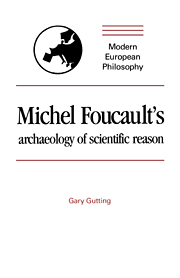Book contents
2 - Madness and mental illness
Published online by Cambridge University Press: 05 June 2012
Summary
Early writings on mental illness
Foucault's first publications appeared in 1954: a monograph entitled Maladie mentale et personnalite (MMP) and a long (120 pages) introduction to the French translation of Ludwig Binswanger's Traum und Existenz (RE). These two works were the culmination of his studies in philosophy and psychology at the Ecole Normale Superieure and provide essential background for understanding his major work on madness, Folie et deraison, published seven years later. They also reflect the strong influence of existential phenomenology and of Marxism on his early work.
MMP appeared again in 1962 in a second edition, retitled Maladie mentale et la psychologie (MMPsy). The first part is essentially the same in the two editions, but the second part has been radically rewritten in the second edition, in accord with the views Foucault put forward in Folie et déraison (FD). Thus, comparing the two editions provides a sense of the development of Foucault's thought from 1954 to 1961 and is very important for understanding his viewpoint in FD. Unfortunately, matters have been very confused by the presentation of the English translation, which is in fact of the 1962 second edition but which gives the copyright date of the original being translated as 1954. This has misled some commentators into thinking that Foucault held already in 1954 views that he in fact developed later.
- Type
- Chapter
- Information
- Michel Foucault's Archaeology of Scientific ReasonScience and the History of Reason, pp. 55 - 110Publisher: Cambridge University PressPrint publication year: 1989



